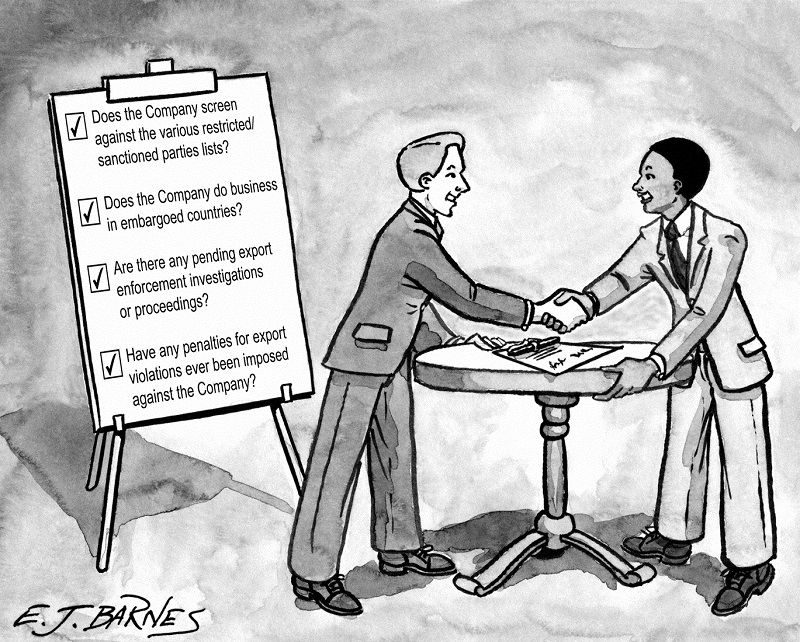by Wes Demory
We streamline the due diligence process, providing timely advice and prioritized remedial actions, where appropriate.
Introduction
Mergers, acquisitions, public offerings of securities, venture capital, private equity investments, and other significant corporate events can trigger due diligence inquiries into export control and trade sanctions compliance. The due diligence process is an opportunity for the interested parties (e.g., underwriter’s counsel, acquirer’s counsel, etc.) to understand the challenges faced by the company’s compliance program and to identify any historical or even ongoing non-compliance. Information gleaned during due diligence may reveal potential liabilities or activities that must be prioritized during integration (for an acquisition).
Thomsen and Burke LLP represents parties initiating due diligence inquiries as well as parties responding to such inquiries. In many cases, we partner with deal counsel to facilitate a timely and appropriate level of review and response, using our experience in a niche practice area to support the larger diligence effort. Our goal is to streamline the process by identifying those critical issues that could impact the transaction, mitigate any historical non-compliance against the risk of enforcement liability, and address any priority action items on which closing is contingent.
Due Diligence Considerations
During the diligence process, the subject company will be asked to disclose a variety of details about its products and services in relation to its global business activities. When representing parties conducting due diligence, we circulate a questionnaire designed to identify potentially material export control or trade sanctions issues, and supplement our analysis with an interview of the company’s trade compliance representatives. Topics include:
- Jurisdiction and Classification: Which government agencies have jurisdiction over the company’s products, technologies and services? How is each classified for export purposes?
- Scope of Exports: How do exports occur and in what form? For example, does the company physically ship items from distribution facilities, distribute software as electronic downloads, or perform onsite professional services?
- Foreign Locations: Where does the company have foreign operations, including branch offices, subsidiaries, and remote workers? How is equipment and information shared between sites?
- R&D and Production: Does the company collaborate with foreign parties on product research and development, or outsource any related tasks to foreign parties? Does the company utilize foreign contract manufacturers?
- Deemed Exports: Do any of the company’s employees or contractors fall within the definition of “foreign persons” subject to the deemed export rule? If so, has the company obtained any required licenses?
- Licensing: Does the company have a process to identify license requirements, prevent unlicensed exports from occurring, and obtain any required licenses? Identify any existing licenses or utilization of license exceptions. Are any license applications currently pending? Have any license applications been denied?
- Restricted Parties: Does the company screen its employees, customers, partners, vendors and other parties against the various U.S. restricted persons lists?
- Violations: Has the company identified any non-compliance, and if so, have government enforcement agencies been notified? Is the company currently under investigation? Has the non-compliance been resolved, or is it still ongoing?
- Sanctions and Embargoes: Does the company engage in any business with parties located in, or affiliated with, countries subject to an embargo or comprehensive trade sanctions? What data is screened to prevent unauthorized transactions?
Responding to Requests
For first-time recipients of due diligence requests, the diligence questions posed can seem confusing, nuanced and repetitive. For companies without a formal trade compliance team, there may not be anyone who is able to answer the questions. When assisting clients, we help manage the due diligence response by translating the requests drafted by lawyers into language understandable by the company’s business managers. If we identify any potential issues, we work with the company to help remediate them early in the process, so that it does not burden the closing process.

Addressing Violations, Potential Liabilities and Voluntary Self-Disclosures
The diligence process may uncover historical violations of U.S. export controls or trade sanctions laws, which can result, for example, in civil monetary penalties of up to $284,582 per violation or twice the value of the underlying transaction, in cases of violations of the Export Administration Regulations (EAR). These violations can represent potential contingent liabilities, if an enforcement agency were to pursue charges. In many cases, the government provides a process to voluntarily disclose prior violations in exchange for a mitigation benefit. The mitigation benefit available depends on the particular agency and nature of the violation, but, in general, the submission of a voluntary self-disclosure (VSD) reduces the maximum civil monetary penalty by half and often results in the issuance of a warning letter, with no monetary penalty.
If we identify violations during the course of the due diligence process, we will advise on the recommended next steps, which may include the submission of a VSD. However, submission is not the goal – timely resolution without a penalty is the goal. By implementing targeted remedial measures that address the compliance failures, and carefully communicating those completed activities to the enforcement agencies, the company can put itself in the best position to resolve the matter without a penalty.
Integration Activities
In the case of acquisitions, the target company may present new compliance challenges for the parent. For example, the target may have products or technologies subject to licensing requirements that are not applicable to the parent, or have a supply chain or distribution channels that are not traditionally utilized by the parent. Or, more commonly, the target company does not have a robust compliance program and exposes the parent to significant compliance gaps. We help the acquiring company prioritize the action items related to integration and manage the gaps during the transition process.
Conclusion
Thomsen and Burke’s goal is to streamline the due diligence process related to export controls and trade sanctions compliance. By leveraging our experience working with technology companies of all sizes and across a variety of industries, as well as with the regulatory agencies on enforcement matters, we provide deal counsel with timely advice and the company with prioritized remedial actions, where appropriate.
Disclaimer: This document may be considered Attorney Advertising. It is provided for informational purposes only and is not to be considered legal advice. Its distribution does not establish an attorney-client relationship. Each situation is unique and the techniques used will differ depending on the facts and circumstances. Therefore, this document does not describe the work that may performed in any particular matter.

